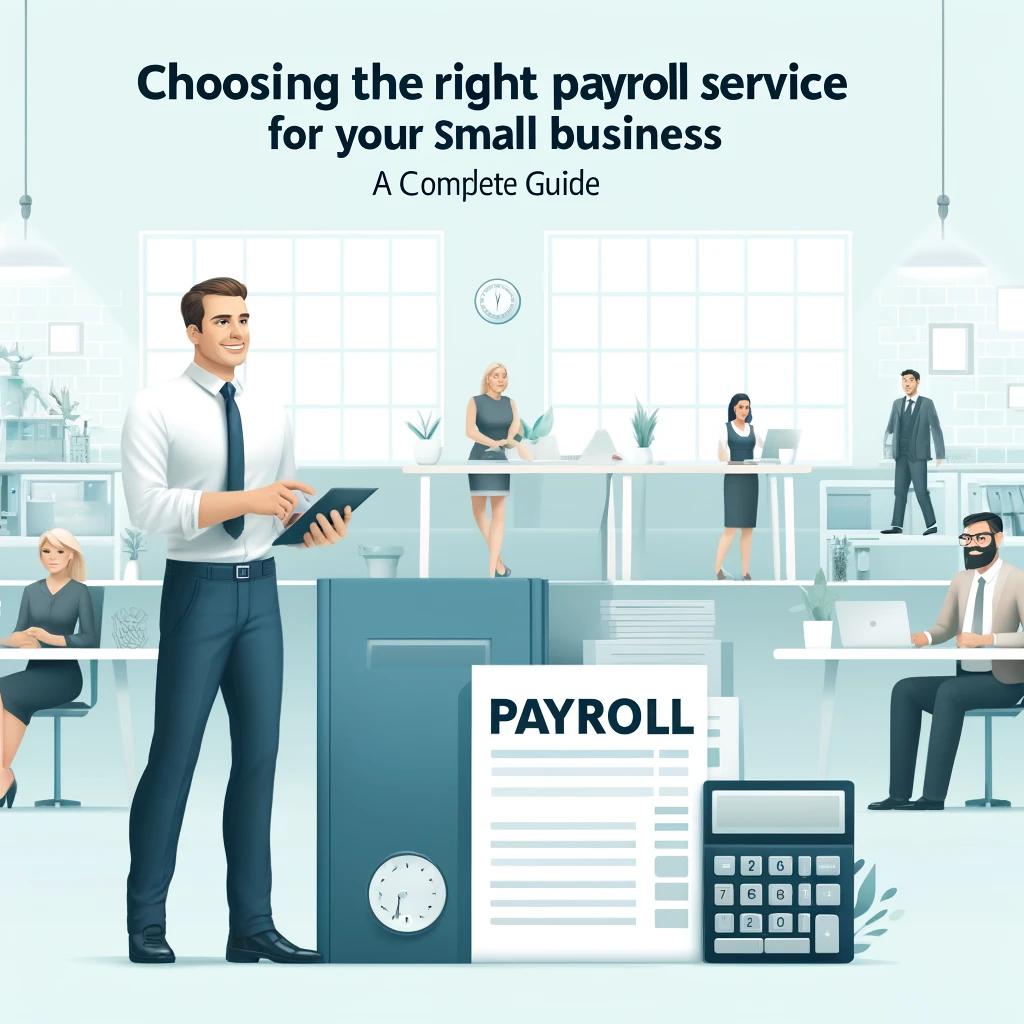Choosing the Right Payroll Service for Your Small Business: A Complete Guide
Finding the perfect payroll service for your small business can seem daunting, but it’s crucial for ensuring smooth operations and legal compliance. Payroll isn’t just about paying your employees; it encompasses tax filing, record keeping, updating payroll policies, and more. The right service can streamline these tasks, allowing you to focus on your core business activities. Understanding your specific needs and evaluating various providers can greatly enhance your business efficiency.
Understanding Payroll Services
Selecting the right payroll service is an important decision that can profoundly impact your business’s efficiency and compliance. Carefully considering your business needs, budget, integration requirements, and the level of customer support can guide you to a solution that best fits your unique circumstances and aids in your business’s growth and success.
1. In-house Payroll
In-house payroll services involve managing payroll functions internally within the business. This method can be attractive for businesses that prefer direct oversight and control over their payroll processes. It enables businesses to tailor payroll functions specifically to their needs, potentially saving on third-party service fees. However, in-house payroll requires dedicated personnel who are proficient in tax regulations, employee benefits, and payroll software. The complexity of maintaining compliance with ever-changing tax laws and regulations necessitates continuous training and knowledge updates. This approach might be practical for businesses with the resources to invest in comprehensive payroll management tools and staff training.
2. Outsourced Payroll
Outsourced payroll services involve hiring an external agency to handle all payroll-related activities. This method can significantly reduce the workload of internal staff and ensure compliance with tax laws and regulations. Payroll agencies possess the expertise and resources to manage payroll tasks efficiently and accurately. They offer a high level of reliability and can handle various payroll functions, including tax filings, employee compensation, and benefits administration. The outsourced service can also scale with your business, accommodating growth and changes in staff numbers. While this option comes at a cost, the value of professional management, minimization of errors, and compliance risks can outweigh the expenses. It allows businesses to focus more on core activities, contributing to overall operational efficiency.
3. Online Payroll Services
Online payroll services have gained popularity in recent years due to their convenience and accessibility. These services offer cloud-based platforms that allow business owners to manage payroll anytime, anywhere. They provide user-friendly interfaces that simplify the payroll process, making it easy for business owners and HR personnel to input employee information, calculate wages, and file taxes. Many online payroll services also include features like direct deposit, employee self-service portals, and compliance monitoring. The integration capabilities with existing tools, such as accounting software and time-tracking systems, streamline administrative tasks and ensure accuracy across platforms. Online payroll services often come with robust customer support, offering immediate assistance through various channels like live chat, email, and phone. This approach suits businesses of all sizes, particularly small and medium enterprises that seek cost-effective and efficient payroll management solutions.
Selecting the right payroll service depends on various factors, including your business size, budget, and specific needs. In-house payroll offers control and customization but demands expertise and resources. Outsourcing provides professional accuracy and reliability, reducing internal workload, while online services deliver convenience and integration, ideal for growing businesses. Making an informed decision involves assessing these options in the context of your business goals and operational requirements.
Factors to Consider When Choosing a Payroll Service
Selecting the right payroll service is a crucial decision for any business, impacting both efficiency and compliance. By carefully evaluating business needs, budget, integration requirements, and the level of customer support, a company can identify a solution that aligns with its unique circumstances, fostering growth and success.
Cost
One of the most significant factors to consider when choosing a payroll service is cost. Business owners must analyze the expense structure of different services, ensuring that the investment aligns with their financial capabilities. Some payroll services charge a flat monthly fee, while others may have variable rates based on the number of employees or the complexity of payroll needs. Weighing these costs against the potential savings in time and error reduction is essential. Budget constraints often dictate the final choice, but it is important not to sacrifice quality for cost.
Features and Functionality
The features and functionality of a payroll service are critical components to evaluate. It is important to ensure that the service offers the necessary tools to align with the business’s specific needs. Some of the essential features include direct deposit and payment options, tax filing and compliance, and reporting and analytics capabilities. Advanced features such as employee self-service portals, mobile access, and automated reminders for payroll deadlines can significantly enhance the payroll process. The better the alignment between the service features and the business requirements, the more effective the payroll system will be.
1. Direct Deposit and Payment Options
Direct deposit and various payment options are fundamental aspects of modern payroll services. They streamline the paycheck distribution process, allowing employees to receive their wages directly into their bank accounts. This method reduces the administrative workload and minimizes the risk of payment errors. Additionally, providing multiple payment options, such as checks and prepaid debit cards, offers flexibility to accommodate different employee preferences.
2. Tax Filing and Compliance
Tax filing and compliance are complex yet crucial components of payroll management. An effective payroll service must have robust systems to manage federal, state, and local tax filings seamlessly. Staying updated with ever-changing tax regulations ensures compliance, thereby avoiding potential penalties and fines. Automatic calculations and submissions reduce the burden on the internal team, ensuring that the payroll process runs smoothly without legal complications.
3. Reporting and Analytics
The ability to generate comprehensive reports and analytics is vital for strategic decision-making. Payroll data offers insights into labor costs, overtime, and financial planning. A payroll service that provides real-time reporting and detailed analytics helps businesses monitor expenses and optimize resources. Features such as customizable reports and trend analysis tools are invaluable for identifying patterns and making informed decisions to drive business growth.
Ease of Use
Ease of use is an essential consideration when selecting a payroll service. A user-friendly interface and intuitive navigation reduce the learning curve, enabling HR personnel and business owners to manage payroll efficiently. Simplified processes for entering employee information, calculating wages, and filing taxes enhance productivity and minimize errors. When evaluating payroll services, it’s crucial to select one that offers a balanced combination of advanced features and straightforward operation.
Customer Support
Reliable customer support is a key factor in choosing a payroll service. Prompt and effective support can resolve issues quickly, minimizing disruptions to payroll operations. Services offering multiple support channels, such as live chat, email, and phone, provide flexibility in accessing assistance when needed. Evaluating the quality of customer support, including responsiveness and expertise, can ensure smooth and trouble-free payroll management.
Integration with Other Systems
The ability to integrate with other business systems is a critical aspect of modern payroll services. Seamless integration with accounting software, time-tracking systems, and HR management tools streamlines administrative tasks and enhances accuracy. Avoiding data duplication and manual entries saves time and reduces the risk of errors, fostering a cohesive and efficient operational environment. The more well-integrated the payroll service, the better it will support overall business functions.
Step-by-Step Guide to Selecting a Payroll Service
Assess Your Business Needs
Understanding the specific requirements of a business is the initial step in selecting the right payroll service. This involves evaluating the number of employees, payroll frequency, and any unique payroll considerations such as multi-state operations or special deductions. The complexity of payroll needs will dictate the level of sophistication required from a payroll service. Additionally, considering future business growth and potential payroll expansion ensures that the chosen service can scale accordingly. A comprehensive assessment of business needs forms the foundation for finding a payroll solution that aligns with organizational goals.
Research Potential Payroll Providers
Once business needs are clearly defined, the next step is to research potential payroll providers. This involves identifying established vendors with a proven track record and a reputation for reliability. Exploring the range of services offered by different providers helps in understanding what each can bring to the table. It is also essential to look for features and services that address specific business requirements, ensuring a tailored fit. Conducting thorough research minimizes the risk of selecting a provider that may not meet the unique demands of a business, leading to smoother payroll operations.
Compare Features and Pricing
Comparing the features and pricing of payroll services is a critical step in the decision-making process. Different providers offer various feature sets, and understanding these differences is crucial. Essential features like direct deposit, tax filing, reporting, and integration capabilities must be evaluated against business needs. Pricing models can vary significantly, ranging from flat fees to per-employee charges. A detailed comparison helps in identifying the best value for the investment, ensuring that the chosen service offers a balanced mix of functionality and cost-effectiveness.
Request Demos and Trials
Requesting demos and trials from shortlisted payroll service providers is an essential practice. This hands-on experience allows businesses to evaluate the user interface, ease of use, and overall functionality. Interacting with the software firsthand provides valuable insights into how it will fit into existing workflows and whether it meets expectations. Trials and demos also offer the opportunity to assess the support and training provided by the vendor, ensuring that the transition to the new payroll system will be smooth and well-supported.
Check Reviews and References
Checking reviews and references from existing customers provides an additional layer of assurance. Reviews offer insights into the experiences of other businesses with the payroll service, highlighting both strengths and weaknesses. References from similar-sized businesses or those within the same industry can provide a clearer picture of what to expect. Evaluating customer feedback helps in identifying potential red flags and ensures that the chosen payroll service has a solid reputation for reliability, support, and performance. This due diligence is essential in making an informed and confident decision.
Common Mistakes to Avoid
Ignoring Hidden Fees
Many businesses fall into the trap of ignoring hidden fees when selecting a payroll service. These fees can include costs for additional features, support, or even per-transaction charges. Ignoring these potential expenses can lead to unpleasant surprises down the line, significantly increasing the overall cost of the service. To avoid this, it is essential to scrutinize the pricing structures and ask providers about any hidden fees upfront. Understanding the full cost structure ensures there are no financial surprises, allowing businesses to budget accurately and avoid unnecessary expenditures.
Not Considering Future Business Growth
Another common mistake is failing to consider future business growth. Businesses often choose a payroll service based on their current needs without anticipating future expansion. This short-sighted approach can result in a payroll service that cannot scale with the business, leading to potential issues such as inefficiencies, increased manual work, or the need to switch providers down the line. By factoring in future growth and scalability during the selection process, businesses can ensure their payroll service will continue to meet their needs as they expand, providing a more sustainable and long-term solution.
Overlooking Customer Support Quality
Overlooking the quality of customer support is another frequent error businesses make when selecting a payroll service. The importance of reliable and accessible customer support cannot be overstated, as payroll is a critical function that must run smoothly. Ineffective support can lead to delays in payroll processing, compliance issues, and overall dissatisfaction. To avoid this pitfall, businesses should assess the quality of customer support by reading reviews, checking response times, and understanding the support options available. Ensuring robust customer support will provide peace of mind and help businesses address any issues promptly and efficiently.



